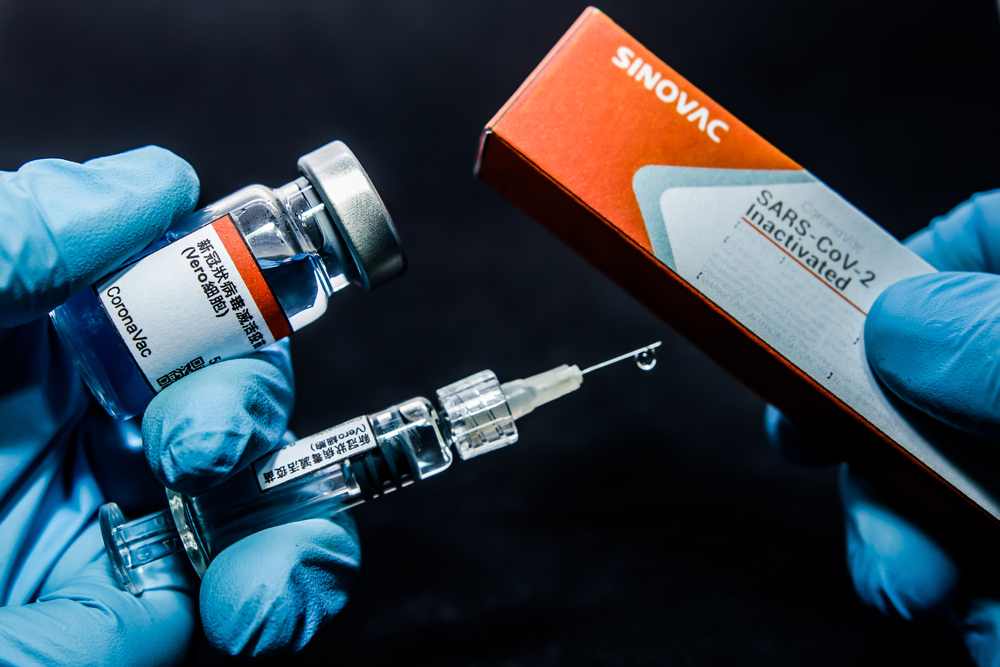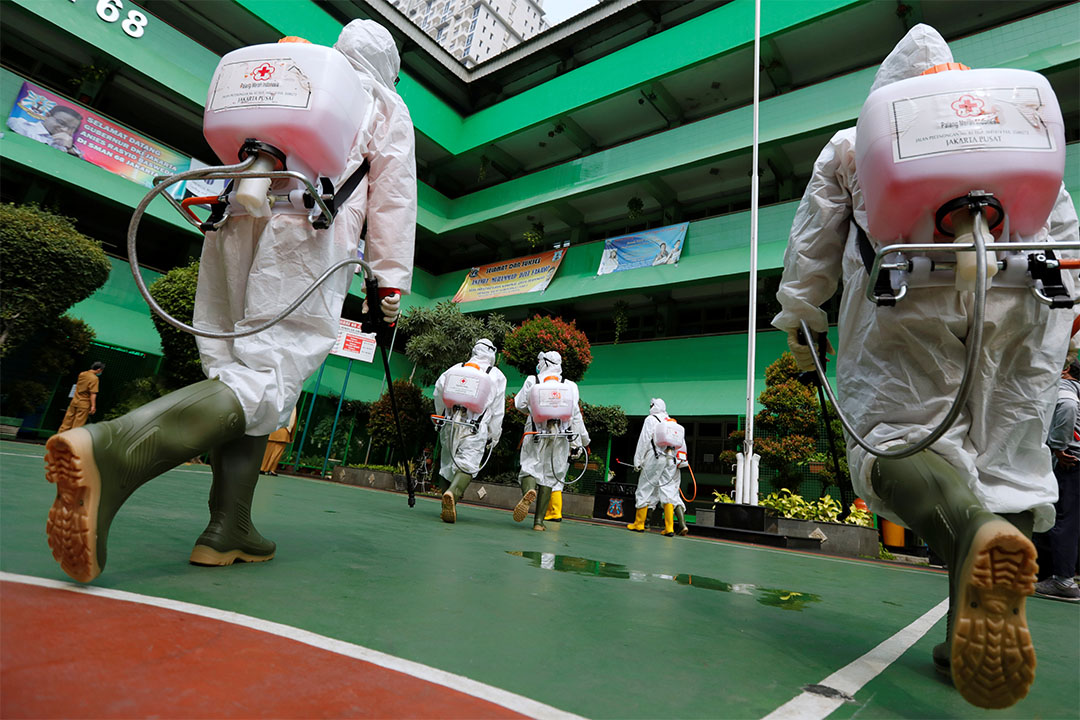
Science's COVID-19 reporting is supported by the Pulitzer Center and the Heising-Simons Foundation.
Brazil, with more COVID-19 cases than any other country after the United States and India, is on the verge of having its first authorized vaccine for the pandemic disease. At a press conference today, Brazilian researchers reported that a vaccine made by a Chinese company, Sinovac, was safe and had 78% efficacy in preventing mild cases of COVID-19 in a study of more than 12,000 health care workers. It also completely prevented moderate and severe illness caused by SARS-CoV-2 infections, the team said. "The result we are seeing today is fantastic," Rosana Richtmann, a physician from the Emilio Ribas Institute of Infectious Disease, said at the press conference.
Dimas Tadeu Covas, head of the Butantan Institute—a state-owned vaccinemaker that is co-sponsoring the trial—expects Brazil's regulatory agency to authorize the vaccine, called CoronaVac, for emergency use in the coming days. "We have now all the documentation to make the request," he says. Brazil also has efficacy trials underway of a COVID-19 vaccine made by AstraZeneca and the University of Oxford and many scientists there expect it, too, to receive authorization soon. But the good news about CoronaVac was overshadowed by complaints that the announcement included little data—and that Sinovac has muzzled its Brazilian collaborators. Indeed, Brazilian researchers had previously held a press conference to announce the vaccine was a success, but were not allowed to give an exact efficacy figure at that time.
Most of the vaccines authorized in other countries rely on high-tech approaches, such as messenger RNA (mRNA) coding for the surface protein of SARS-CoV-2 or a harmless viral vector carrying the gene for that protein—the approach taken by the AstraZeneca-Oxford vaccine. But Sinovac turned to a more established approach. Its vaccine, which is also in efficacy trials in Turkey and Indonesia, relies on the whole coronavirus, chemically crippled so it can't cause disease. The reported efficacy against mild disease falls short of the roughly 95% achieved by two mRNA vaccines. But the "main purpose" of COVID-19 vaccines, Covas says, is to prevent infected people from progressing to severe disease. A different whole, inactivated SARS-CoV-2 vaccine made by Sinopharm's China National Biotec Group has nearly identical results, the company reported last week from a large efficacy trial in several Middle Eastern countries.
Both Sinovac and Sinopharm have kept a tight lid on what their partners can reveal about their vaccines. At the 23 December 2020 press conference held at the governor's residence in São Paulo, researchers said that because of a contractual agreement with Sinovac they could only report CoronaVac had greater than 50% efficacy, an internationally accepted standard for emergency authorization. Today's presentation revealed the specific efficacy rate, but researchers were coy about describing the exact number of people who developed disease in the vaccinated and placebo arms.
In a formal presentation of the data at Butantan today, Covas made no mention of case numbers, saying the data will be reported in a scientific publication and to Brazilian regulators. But when pressed by journalists, he allowed that there were 218 cases of mild disease. "The exact number is 160-something in the placebo group and less than 60 in the vaccinated group," he said. (This would equal 63%, not 78%, efficacy.) CoronaVac appeared to work as well in the elderly as in other age groups, the researchers added.
The lack of data—let alone the efficacy discrepancy—predictably led to immediate skepticism. "Until they show us these numbers, it is nothing more than an empty announcement," tweeted epidemiologist Denise Garrett, a vice president of the nonprofit Sabin Vaccine Institute.
Details have been in short supply in the initial efficacy trial announcements by other COVID-19 vaccinemakers as well. But a researcher who runs one of the 16 sites conducting the CoronaVac trial in Brazil, Esper Kallas at the University of São Paulo's main campus, says even study investigators still don't know all the data. Kallas, who spoke with Science after the press conference, is "happy" about the results. "We know the 78% is true," he says. But he is frustrated that "we don't have the granularity of it." As for the case numbers Covas mentioned, Kallas says, "I couldn't understand those figures."
Sinovac did not reply to Science's request for more information. But Kallas says the root of the disagreement between Butantan and Sinovac is what constitutes a confirmed case of COVID-19, as definitions can vary. The greater the number and severity of symptoms a trial subject must have to count as a case, the higher a vaccine's efficacy will appear to be. The Brazil team and the vaccinemaker were at odds about whether a case has to show one recognized COVID-19 symptom or two, in addition to a positive polymerase chain reaction test for the virus.
Researchers testing CoronaVac in Turkey apparently faced no such hurdles. On 24 December 2020 they revealed preliminary data showing 26 COVID-19 cases out of 570 participants who received the placebo and three cases in the 752 vaccinated volunteers. This translated to 91.25% efficacy and no serious safety issues surfaced. The next analysis will occur at 40 cases, says Murat Akova, a researcher at Hacettepe University who is helping run the study. Asked about the restrictions on Brazilian researchers, Akova says there is "no such contract with Sinovac about releasing data."
The CoronaVac trial has come under fire from Brazilian President Jair Bolsonaro, who has a strong bias against China and the vaccine itself and is a political rival of the governor of São Paulo state. But Sinovac, which has negotiated with São Paulo's governor, will send Brazil enough vaccine for 46 million doses. (Two doses per person are needed for full protection.) Butantan also started to make the vaccine itself and hopes to produce about 1 million doses per day. Covas says the institute has begun negotiations with several Latin American countries that want to obtain the vaccine.
Kallas, who has conducted about 15 clinical trials of different vaccines, says he has never seen more aggressive attempts to control the release of data, and fears they undermine a highly positive message. "If you can prevent someone being seen by a doctor by 78% and prevent hospital admissions by 100%, let's give a toast and celebrate," he says.
COVID-19 Update: The connection between local and global issues–the Pulitzer Center's long standing mantra–has, sadly, never been more evident. We are uniquely positioned to serve the journalists, news media organizations, schools, and universities we partner with by continuing to advance our core mission: enabling great journalism and education about underreported and systemic issues that resonate now–and continue to have relevance in times ahead. We believe that this is a moment for decisive action. Learn more about the steps we are taking.







